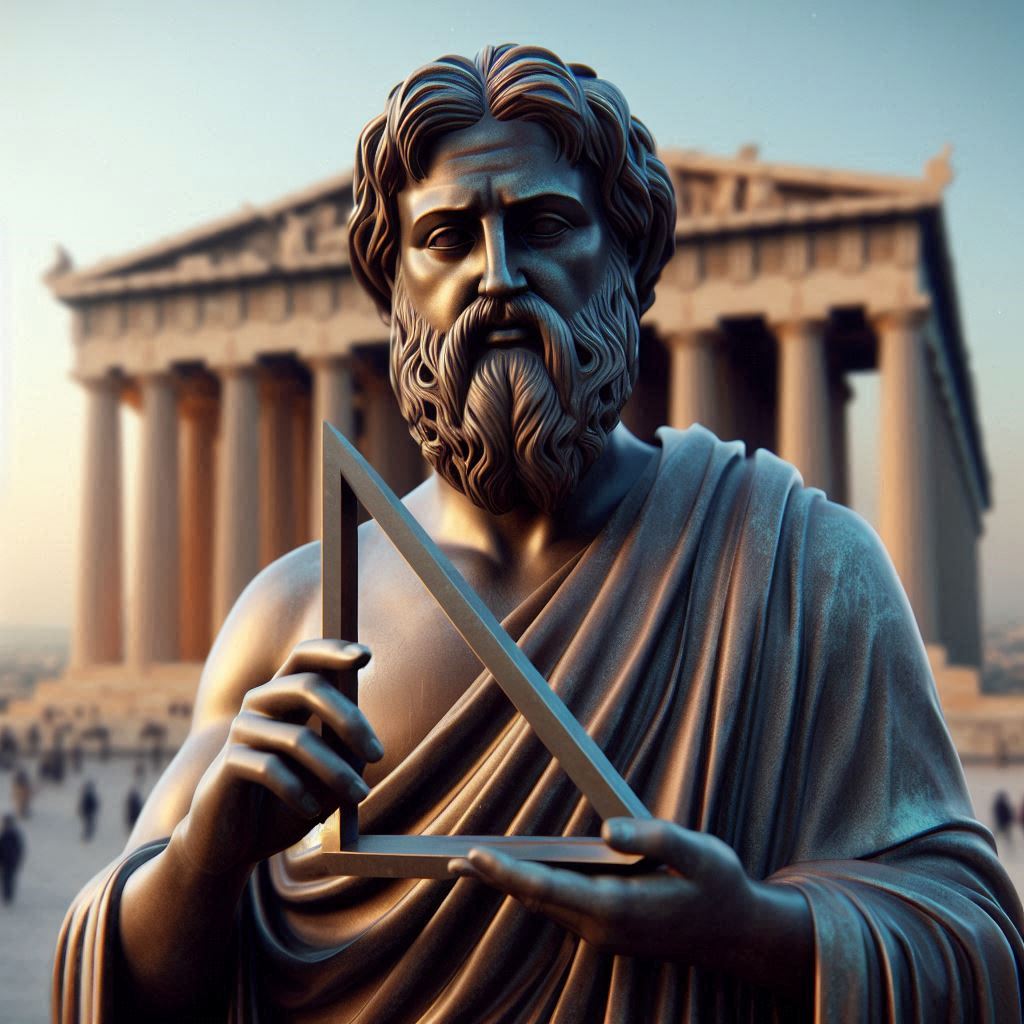Pythagore : le philosophe, le mathématicien et le penseur mystique
Table des matières
- Introduction
- Origines de Pythagore
- La vie de Pythagore
- Travail et enseignements
- Théories et contributions célèbres
- Conclusion
Introduction
Pythagore de Samos est l'une des figures les plus influentes de la philosophie et des mathématiques de l'Antiquité. Connu pour ses contributions à la géométrie, en particulier le théorème de Pythagore, il était plus qu'un simple mathématicien ; c'était un penseur mystique dont les idées s'étendaient des mathématiques à l'éthique, à la métaphysique et à la musique. Pythagore a fondé une école dans la Grèce antique où il a enseigné un mélange de mathématiques, de philosophie et d'enseignements spirituels, laissant un héritage qui continue d'inspirer les mathématiciens, les philosophes et les mystiques.
Origines de Pythagore
Pythagore est né vers 570 avant J.-C. sur l'île de Samos, en Grèce. Ses parents, Mnésarque et Pythaïs, étaient probablement aisés, ce qui lui a permis de bénéficier d'une éducation poussée. Ses années de formation ont été remplies de voyages et d'études, qui l'ont conduit dans des endroits comme l'Égypte et Babylone. Il y a absorbé des connaissances de diverses cultures, établissant ainsi les bases de sa philosophie de l'harmonie et de l'interdépendance.

La vie de Pythagore
La vie de Pythagore est entourée de mystère, en partie à cause du secret qui entourait ses enseignements. Après son retour en Grèce, il fonda une école à Crotone, dans le sud de l'Italie. L'école, souvent décrite comme une « confrérie », combinait pratiques religieuses et études intellectuelles. Les disciples de Pythagore, connus sous le nom de pythagoriciens, adhéraient à un mode de vie strict comprenant des règles alimentaires, une vie en communauté et des principes éthiques.
Il vivait et enseignait des valeurs fondées sur l'harmonie, la discipline et la pureté spirituelle. Beaucoup de ses disciples le vénéraient presque comme une figure divine, attribuant des qualités mystiques à ses connaissances.

Travail et enseignements
Pythagore a apporté des contributions importantes aux mathématiques, à la philosophie et même à la musique. Il considérait les nombres comme l'essence fondamentale de l'univers, une idée connue sous le nom de « numérologie ». Sa croyance en la nature divine des nombres l'a conduit à explorer des modèles à la fois en mathématiques et en musique, ce qui a abouti à la découverte d'intervalles musicaux basés sur des rapports numériques.
L'un des aspects les plus singuliers des enseignements pythagoriciens était le concept de métempsychose ou de transmigration des âmes, qui suggérait que les âmes humaines se réincarnent. Cette croyance était au cœur des enseignements moraux de Pythagore et a façonné ses idées sur l'interdépendance de la vie et du cosmos.
Pythagore est surtout connu pour le théorème de Pythagore en géométrie
Théories et contributions célèbres
- Le théorème de Pythagore : Pythagore est surtout connu pour son théorème de Pythagore en géométrie. Ce théorème stipule que dans un triangle rectangle, le carré de la longueur de l'hypoténuse est égal à la somme des carrés des longueurs des deux autres côtés. Cette idée simple mais puissante est fondamentale en mathématiques et trouve aujourd'hui des applications dans de nombreux domaines.
- Numérologie et harmonie des nombres : Pythagore croyait que les nombres avaient des qualités divines et qu'ils étaient l'essence de toutes choses. Son exploration des nombres l'a conduit à comprendre les rapports harmoniques en musique. Il a découvert que certains rapports numériques correspondaient à des sons harmonieux, constituant la base de la théorie musicale occidentale.
- La Tétractys : Symbole mystique d'un arrangement triangulaire de dix points, la Tétractys était considérée comme sacrée par les pythagoriciens. Elle représentait l'harmonie du cosmos et devint un symbole d'unité spirituelle et d'ordre mathématique.
- La transmigration de l'âme : Pythagore croyait à la réincarnation, ou à la transmigration de l'âme, et enseignait que les âmes subissent un cycle de renaissances. Cette idée, bien que métaphysique, a influencé ses enseignements éthiques et ses vues sur la parenté entre tous les êtres vivants.
Conclusion
Pythagore était un visionnaire dont les idées allaient bien au-delà des mathématiques, touchant à la philosophie, à l'éthique et à la spiritualité. Son héritage se retrouve non seulement dans le théorème de Pythagore, mais aussi dans l'influence que son école a eu sur les penseurs ultérieurs, notamment Platon et, indirectement, sur une grande partie de la philosophie occidentale. Que ce soit en tant que mystique, philosophe ou mathématicien, la vie et les enseignements de Pythagore offrent des aperçus intemporels sur la relation entre les mathématiques et le cosmos, nous rappelant l'unité profonde que les nombres et l'harmonie peuvent révéler.



